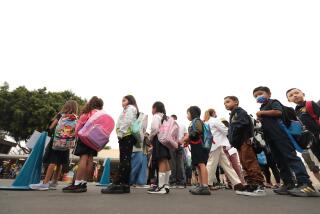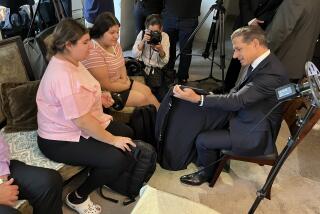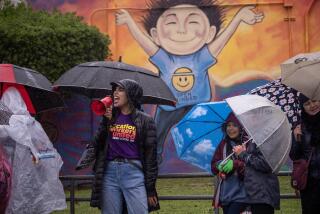âOur lives are hanging by a threadâ: Latino parents with chronic diseases fear COVID-19 as schools reopen
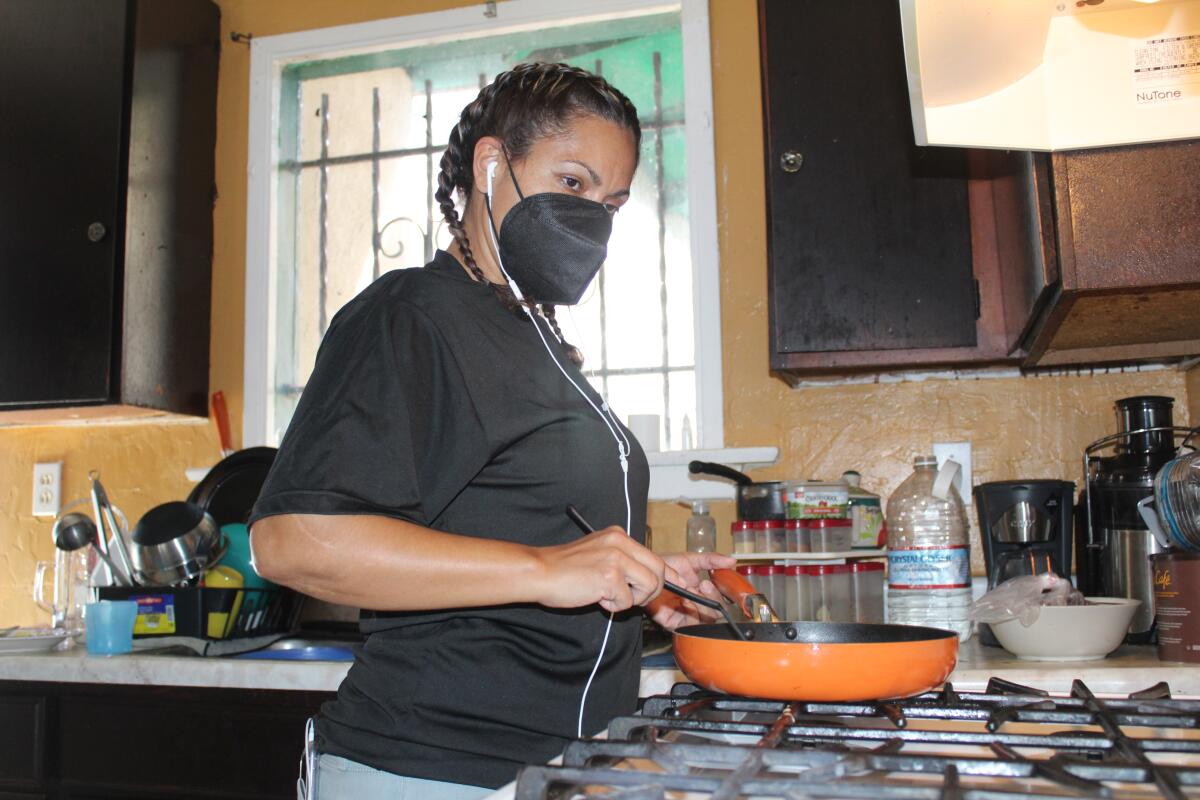
They all say they suffer from several common concerns: They are Latino immigrant parents, live in working-class neighborhoods and fear for their lives as Los Angeles public schools reopen.
Some are cancer survivors with weakened immune systems. Others have chronic illnesses or have children with chronic illnesses. Some are allergic to vaccines.
They also have a question for school officials: If we get sick or die from COVID-19, who will take care of our children?
Thatâs the anxious thought that arises time and again for Karla Franco Hernández, a 40-year-old mother who has rheumatoid arthritis and says sheâs allergic to vaccines. Sitting at her familyâs dining room table recently, she meted out the multiple pills she takes daily. Despite her relatively young age, her life revolves around drugs, she said.
âI feel like death is haunting me since California authorities gave the green light for school districts to open in person,â she said, speaking through a mask that partly drowned out her voice.
As the mother of a 12-year-old girl, Jeyline, and a 15-year-old boy, John â both Los Angeles Unified School District students â Franco Hernández wants her children to resume normal lives. But sheâs wary of what they might bring back from their classrooms.
âI am a high-risk person and I believe that school officials have ignored parents with chronic illnesses and the consequences that opening schools can cause at home,â the immigrant from Jalisco, Mexico, said.
âIf I donât send them, but they decide to go out and play with friends who attend school, there is also a high risk of contagion, âshe said.
The resident of South Gate, where there have been at least 226 pandemic-related deaths, belongs to a group of LAUSD parents who advocate halting schools from reopening.
Last week, after months of wrangling between the district and wary teachers union officials, the district began a gradual and partial reopening of schools serving its 465,000 students. Safety provisions include mandatory coronavirus testing for students and staff as well as six-foot distancing between desks.
A total of 61 LAUSD elementary schools and 11 early childhood centers were scheduled to welcome back students last week for the first time in 14 months. The remaining elementary schools and early education centers â more than 500 in all â will reopen this week, and middle and high school campuses will reopen next week. LAUSD also is opening 25 school-based vaccination centers to help families in their communities.
Many Latino parents have expressed concern about their childrenâs return to face-to-face classes because COVID-19 has disproportionately hit Latino and Black communities. Latinos make up nearly three-quarters of LAUSDâs student population.
The parents, who meet weekly through Zoom to discuss their concerns in groups of up to 30, this month posted a letter on Change.org calling for Latino parents to have greater representation in LAUSD. They assert that they have no guarantee that all teachers will be vaccinated by the time children return to classrooms, and doubt that all schools will adhere to the required hygiene protocols.
The letter, sent to LAUSD Supt. Austin Beutner and the school board, contends that parentsâ voices have been silenced by the district, the United Teachers Los Angeles union, and politicians who supported reopening schools with only a few months left in the academic year.
âApparently, they make plans without taking into account that our Hispanic community has been severely impacted by the Covid-19 virus,â states the letter from the group, whose official name is Our Voice: Communities for Quality Education.
âToo many families have lost loved ones and gotten sick from the pandemic. We have had less access to vaccines and urgent, necessary and high-quality medical care.â
The parents are asking for clear evidence showing herd immunity in the community for children to return safely to in-person classes, and that in-person instruction not resume until August. They also call for creating a committee of parents to inspect schools to check for compliance with COVID-19 guidelines, and a committee of parents to be developed as neutral mediators in negotiations between the district and the unions on a range of subjects. Theyâre also asking to have a parent representative on the districtâs governing board.
At three school district meetings, Franco Hernández said, she asked what would happen if children brought the disease home and parents got sick.
âNobody knows how to answer me. Nobody wants to bear the consequences,â said Franco Hernández, who has been a school activist since 2005, seven years after she arrived in the United States.
In-person school openings have divided parents. A March 29 LAUSD survey of families showed that 49% of elementary school parents wanted their children to return to the classroom, as did 35% of middle school parents and 25% of high school parents. More than one-quarter of families had yet to respond.
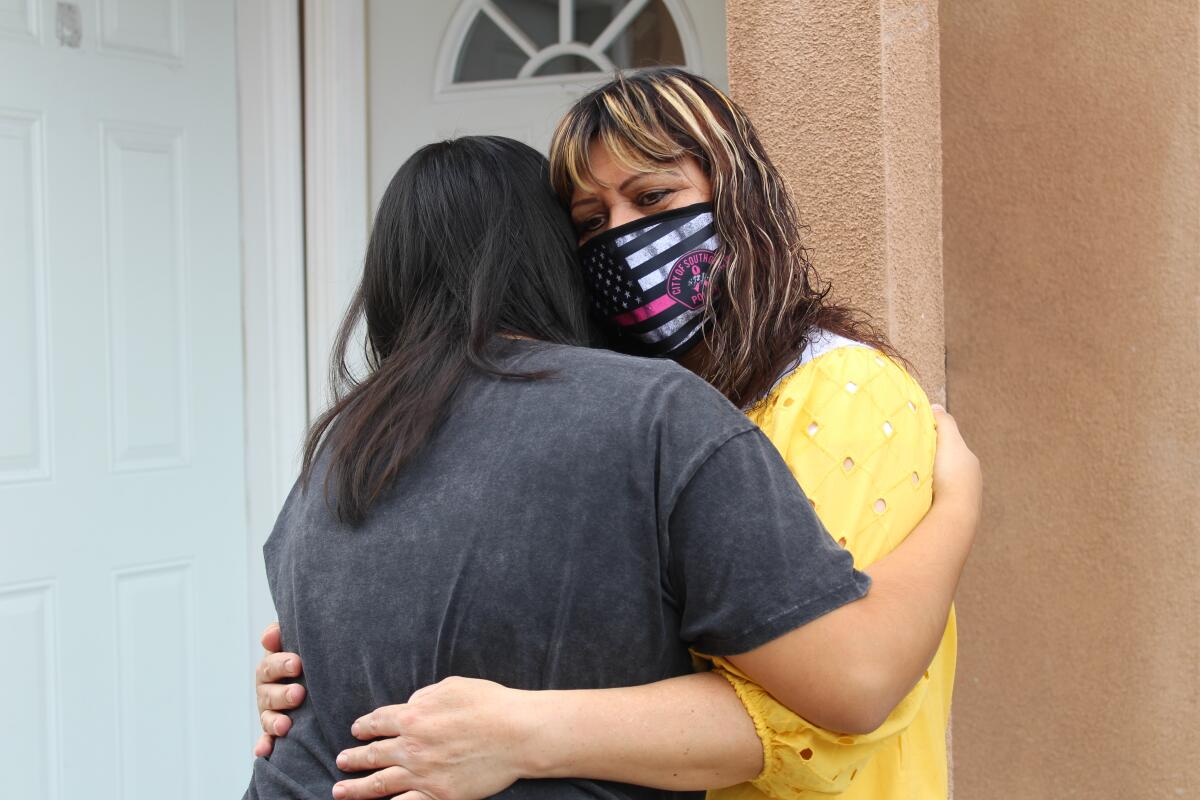
Rosa Amarillas, a breast cancer and diabetes survivor, fears that COVID-19 could end her life.
âSick parents were ignored.... We were given a meeting about whether we wanted to send the children to school when the district had already acceded to the stateâs suggestions, and now our lives are hanging by a thread,â Amarillas said.
The 54-year-old South Los Angeles resident, who has a 14-year-old daughter in LAUSD, said that talking about the intimate details of her health history makes her feel very vulnerable.
âHowever, it is necessary for people to know what some parents are going through,â she said.
âIt would be devastating to see my daughter Ashley sick,â she said. âBut if she is asymptomatic and she infects me without knowing it, like many children, then if the cancer did not end my life, the coronavirus could kill me.â
The immigrant mother from Sonora, Mexico, who has lived in Los Angeles since 1993, highlighted that Latino, immigrant and poor communities have been among the most devastated groups in the pandemic.
âBeing a Latina, being low-income, living in a poor neighborhood, having chronic illnesses and having only one income brings me closer to death,â she said.
One of Amarillasâ biggest concerns about resuming in-person classes is that LAUSD teachers canât be forced to get vaccinated.
âAt school board meetings we have been told that the vaccine is voluntary. There are teachers who do not believe in vaccines, there are others who because they are allergic or because of their religious beliefs are not going to get vaccinated.... That leaves many more vulnerable families,â Amarillas said.
In an interview via Zoom, Los Angeles County Office of Education Deputy Supt. Arturo Valdez said that whether to get vaccinated is an âindividual decisionâ for each teacher.
Valdez said he did not know the specific number of teachers who have been vaccinated, but said that the vaccine has been made available to 95% of those whoâve requested it. He estimated that 25% to 30% of teachers have refused to be vaccinated.
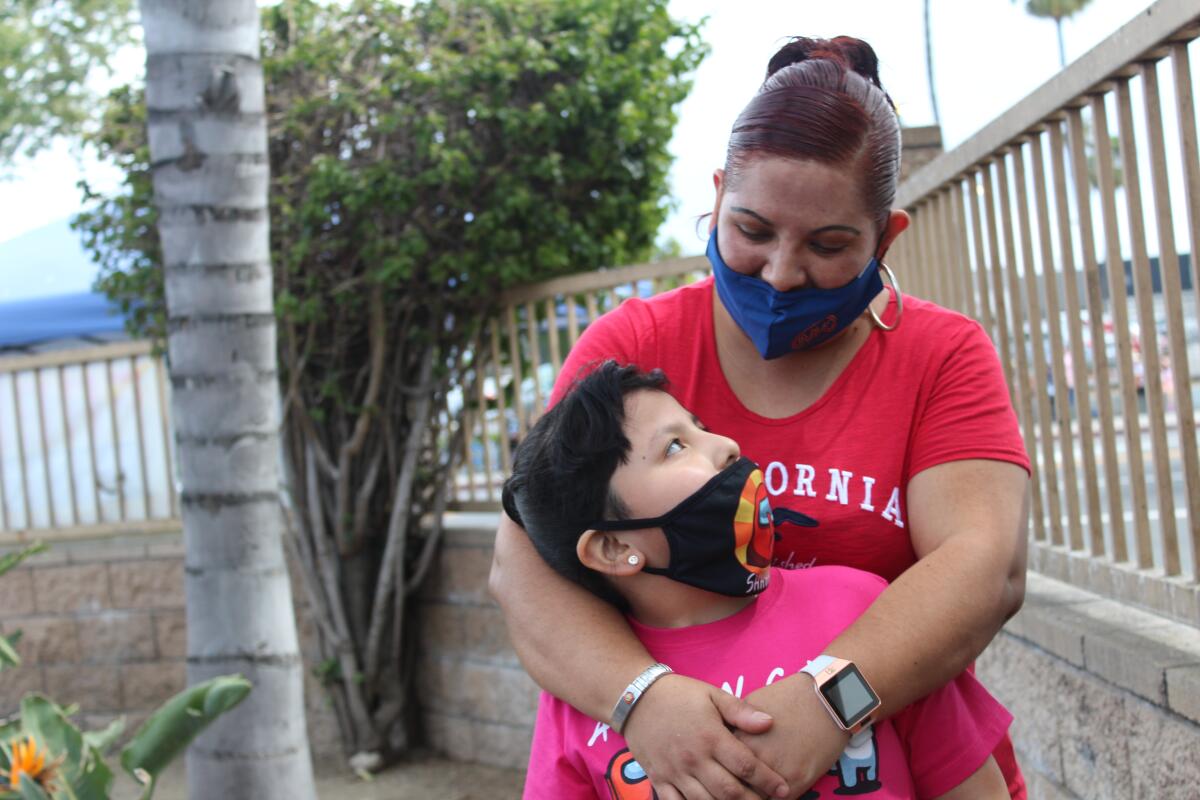
Gabriela Rangel, a 37-year-old mother who has multiple sclerosis, worries about the risks that she could be exposed to through her four children, who attend LAUSD schools. One of them, Arleth, a third-grader, has asthma and is allergic to antibiotics.
The Maywood resident â a single mother who emigrated from Mexico in 2003 and makes her living cleaning homes â said that even worse than her own degenerative illness is her fear that Arleth someday could be hospitalized.
âI have the need for my children to go to school in order to get more work, but at the same time I need to live for them. What would others do in my situation? I think I will have them at home a little longer, âshe said.
More to Read
Sign up for Essential California
The most important California stories and recommendations in your inbox every morning.
You may occasionally receive promotional content from the Los Angeles Times.
